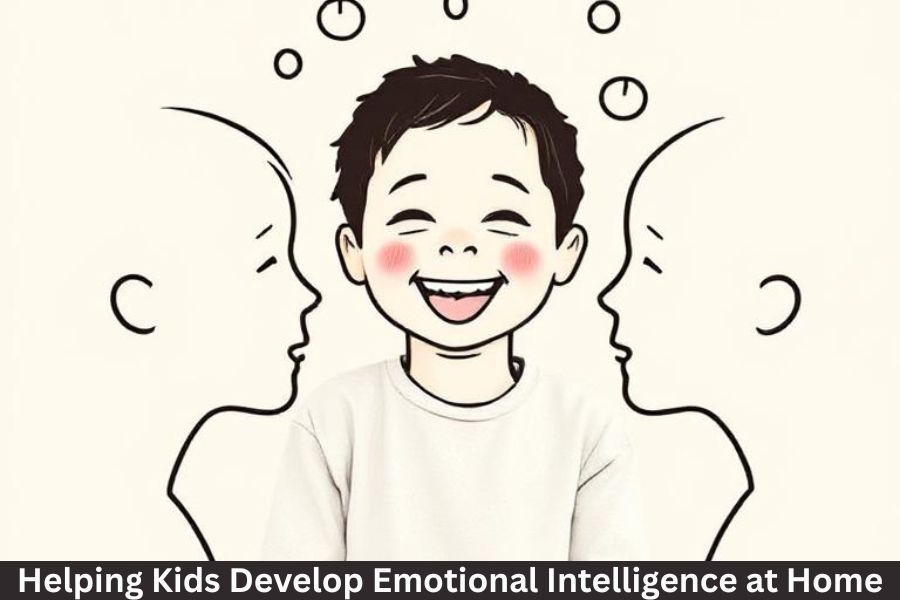In a world that’s increasingly fast-paced and complex, raising emotionally intelligent children is more important than ever. Emotional intelligence (EI), often referred to as emotional quotient (EQ), is the ability to recognize, understand, manage, and express emotions—both your own and those of others.
While schools play a role, emotional intelligence is first nurtured at home. As a parent or caregiver, you are your child’s first emotional coach. Helping your child develop strong emotional skills early on lays the foundation for healthy relationships, academic success, and overall well-being.
So, how can you support your child in developing emotional intelligence at home? Let’s explore practical strategies that really work.
What Is Emotional Intelligence?
Emotional intelligence involves five key components:
- Self-awareness – Recognizing your own emotions
- Self-regulation – Managing emotions in healthy ways
- Motivation – Channeling emotions toward positive goals
- Empathy – Understanding the feelings of others
- Social skills – Managing relationships and communicating effectively
Kids with high EQ are better at handling conflict, solving problems, and adapting to change.
Why Emotional Intelligence Matters for Kids
- Improves communication and relationships
- Reduces behavioral issues
- Boosts academic performance
- Builds resilience and self-confidence
- Supports mental health and stress management
By developing EQ, children are better equipped to navigate life’s challenges—both big and small.
How to Nurture Emotional Intelligence at Home
1. Label and Validate Emotions
Help your child name their feelings. Instead of saying, “Don’t cry,” try, “I can see you’re upset. Do you want to tell me what’s wrong?”
Use phrases like:
- “That sounds frustrating.”
- “I understand why you’re feeling sad.”
- “It’s okay to feel angry. Let’s talk about it.”
This teaches children that emotions are normal and manageable.
2. Be a Role Model
Kids learn more from what you do than what you say. Show them how you handle stress, resolve conflicts, and express feelings. If you’re feeling overwhelmed, it’s okay to say, “I’m feeling a little stressed right now, so I’m going to take a few deep breaths.”
3. Create a Safe Emotional Space
Encourage open conversations. Let your child know they can express any emotion without fear of punishment or shame. Active listening, without rushing to fix the problem, helps kids feel heard and supported.
4. Teach Problem-Solving Skills
When your child faces a challenge, guide them through the steps:
- What happened?
- How do you feel?
- What can you do next time?
This empowers them to think critically and manage future situations more effectively.
5. Use Books and Stories
Reading books that explore emotions can be a great tool for sparking discussion. Ask questions like:
- “How do you think the character felt?”
- “What would you do in that situation?”
Stories help children see emotions in context and build empathy.
6. Practice Mindfulness and Calm-Down Techniques
Teach simple strategies like:
- Deep breathing
- Counting to 10
- Drawing or journaling
- Taking a short break
These tools help kids regulate emotions and calm themselves during stressful moments.
7. Praise Emotional Growth
Acknowledge when your child shows emotional maturity:
- “I noticed how you stayed calm when your toy broke. That was really grown-up of you.”
Positive reinforcement encourages repetition of emotionally intelligent behavior.
FAQs: Helping Kids Develop Emotional Intelligence
Q1: At what age should I start teaching emotional intelligence?
You can start as early as toddlerhood. Even very young children can begin learning emotional vocabulary and basic empathy.
Q2: What if my child is very emotional or easily upset?
That’s okay! Emotional kids often feel things deeply, which can be a strength. Focus on teaching regulation strategies, not suppression.
Q3: Can screen time affect emotional intelligence?
Excessive screen time, especially without social interaction, can limit emotional growth. Balance screen use with meaningful conversations and family activities.
Q4: Are there apps or tools that help with emotional learning?
Yes! Apps like Smiling Mind, Breathe, Think, Do with Sesame, and Mood Meter can help kids understand and manage emotions.
Q5: How do I know if my child is emotionally intelligent?
Signs include being able to name emotions, show empathy, resolve conflicts peacefully, and express feelings in appropriate ways.



